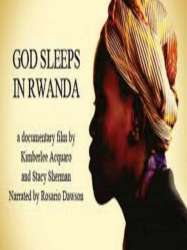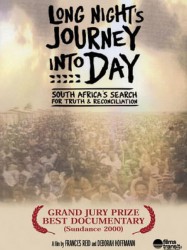Screamers est un film américain de genre Documentaire avec Shavo Odadjian
Screamers (2006)

Si vous aimez ce film, faites-le savoir !
Durée 1h29
OrigineEtats-Unis
Genres Documentaire
Themes Afrique post-coloniale, Le racisme, Documentaire sur la discrimination, Documentaire sur le droit, Documentaire sur la guerre, Documentaire historique, Documentaire sur une personnalité, Documentaire sur la politique, Politique
Note58%










Screamers is a 2006 documentary by director Carla Garapedian conceived by Peter McAlevey and Garapedian and produced by McAlevey. The film explores why genocides have occurred in modern day history and features talks from Serj Tankian, lead vocalist of the American alternative metal band System of a Down, whose grandfather is an Armenian Genocide survivor, as well as from human-rights activist, journalist, and professor, Samantha Power, as well as various other people involved with genocides in Rwanda and Darfur.
[...]Voir plus...
Acteurs

Shavo Odadjian
(Lui-même)
Bande annonce de Screamers
Bluray, DVD
Streaming / VOD
Commentaires
Postez un commentaire :
Suggestions de films similaires à Screamers
Il y a 0 films ayant les mêmes acteurs, 8969 ayant les mêmes genres cinématographiques, 11441 films qui ont les mêmes thèmes (dont 16 films qui ont les mêmes 9 thèmes que Screamers), pour avoir au final 70 suggestions de films similaires.Si vous avez aimé Screamers, vous aimerez sûrement les films similaires suivants :

L'Afrique en morceaux (2000)
, 1h44Origine France
Genres Documentaire
Thèmes Afrique post-coloniale, Le racisme, Documentaire sur la discrimination, Documentaire sur le droit, Documentaire sur la guerre, Documentaire historique, Documentaire sur une personnalité, Documentaire sur la politique, Politique
Avril 1994 : génocide au Rwanda. 800 000 morts. Une catastrophe qui entraînera des déséquilibres dans toute la région. L’Afrique des Grands Lacs finit le siècle dans un bain de sang. Ce documentaire montre les intrigues, les coups d’éclat, les trahisons, les vengeances qui ont prévalu durant ces années avec pour seuls objectifs de conserver ou d’agrandir sa zone d’influence. C’est ainsi que cette décennie a vu s’envoler peu à peu tous les espoirs des populations. Espoirs d’une Afrique maîtresse de son destin, d’une autosuffisance alimentaire, de l’arrêt des conflits interethniques…

God Sleeps in Rwanda (2005)
, 28minutesGenres Documentaire
Thèmes Afrique post-coloniale, Le racisme, Documentaire sur la discrimination, Documentaire sur le droit, Documentaire sur la guerre, Documentaire historique, Documentaire sur une personnalité, Documentaire sur la politique, Politique
Acteurs Rosario Dawson
Note71%






Mon voisin, mon tueur (2009)
, 1h20Réalisé par Anne Aghion
Origine France
Genres Documentaire
Thèmes Afrique post-coloniale, Le racisme, Documentaire sur la discrimination, Documentaire sur le droit, Documentaire sur la guerre, Documentaire historique, Documentaire sur une personnalité, Documentaire sur la politique, Politique
Note75%






Sweet Dreams (2012)
, 1h26Réalisé par Lisa Fruchtman
Origine Etats-Unis
Genres Drame, Documentaire, Historique, Musical
Thèmes Afrique post-coloniale, La musique, Le racisme, Documentaire sur la discrimination, Documentaire sur le droit, Documentaire sur la guerre, Documentaire historique, Documentaire sur la musique, Documentaire sur une personnalité, Documentaire sur la politique, Musique, Politique
Note76%






Umurage (2002)
, 52minutesOrigine Espagne
Genres Documentaire
Thèmes Afrique post-coloniale, Le racisme, Documentaire sur la discrimination, Documentaire sur le droit, Documentaire sur la guerre, Documentaire historique, Documentaire sur une personnalité, Documentaire sur la politique, Politique
Au Rwanda, une centaine de membres de l’association Ukuri Kuganze, essentiellement formée de survivants du génocide, et quelques-uns de leurs bourreaux, libérés après d’être confessés et avoir demandé pardon en 2003, se réunissent dans un centre de réinsertion. Ces bourreaux retournent chez eux, souvent dans les lieux mêmes où ils ont perpétré leurs crimes et ils doivent « faire face » à leurs victimes et leur demander pardon. En 1994, en l’espace de 100 jours, près d’un million de personnes avaient été assassinées, soit près de 10 000 morts chaque jour.
 , 1h
, 1hRéalisé par Andrew Goldberg
Origine Etats-Unis
Genres Documentaire
Thèmes Afrique post-coloniale, Le racisme, Religion, Documentaire sur la discrimination, Documentaire sur le droit, Documentaire sur la guerre, Documentaire historique, Documentaire sur une personnalité, Documentaire sur la politique, Documentaire sur la religion, Politique, Religion juive
Note67%





 , 1h31
, 1h31Réalisé par Peter Raymont
Origine Canada
Genres Documentaire
Thèmes Afrique post-coloniale, Le racisme, Documentaire sur la discrimination, Documentaire sur le droit, Documentaire sur la guerre, Documentaire historique, Documentaire sur une personnalité, Documentaire sur la politique, Politique
Note80%





Documentaire sur l'histoire du Lieutenant General canadien Roméo Dallaire, dont la manière de diriger la mission des Nations Unies durant le génocide au Rwanda en 1994 a été très critiquée.

Flower in the Gun Barrel (2008)
Origine Etats-Unis
Genres Documentaire
Thèmes Afrique post-coloniale, Le racisme, Documentaire sur la discrimination, Documentaire sur le droit, Documentaire sur la guerre, Documentaire historique, Documentaire sur une personnalité, Documentaire sur la politique, Politique
Note80%





To a large extent, the film consists of interviews with genocide survivors, many of whom were children in 1994. In all, over thirty survivors, perpetrators, and experts were interviewed for the film. In these interviews, the survivors discuss what it means to be a Rwandan and to live next door to people who killed their families. The survivors describe how they deal with their country's request that they forgive one another and move on, so that Rwanda can rebuild and unify itself. Perpetrators' views illuminate the madness that seized the culture in 1994; exploring the experience of apologizing to victims, and examining what it is like to be looked at as a murderer in Rwandan society.

Rwanda pour mémoire (2003)
, 1h8Réalisé par Samba Félix Ndiaye
Origine France
Genres Documentaire
Thèmes Afrique post-coloniale, Film sur un écrivain, Le racisme, Documentaire sur la discrimination, Documentaire sur le droit, Documentaire sur la guerre, Documentaire historique, Documentaire sur une personnalité, Documentaire sur la politique, Politique
Entre avril et juillet 1994, le massacre Tutsis et des Hutus modérés a fait un million de morts. À l’initiative de Fest’Africa, une dizaine d’auteurs africains se sont retrouvés en résidence d’écriture à Kigali, quatre ans après les évènements, cherchant à briser le silence des intellectuels africains sur le génocide.
 , 1h34
, 1h34Origine Etats-Unis
Genres Documentaire
Thèmes Afrique post-coloniale, Le racisme, Documentaire sur la discrimination, Documentaire sur le droit, Documentaire sur la guerre, Documentaire historique, Documentaire sur une personnalité, Documentaire sur la politique, Politique
Acteurs Helen Mirren
Note75%





 Connexion
Connexion